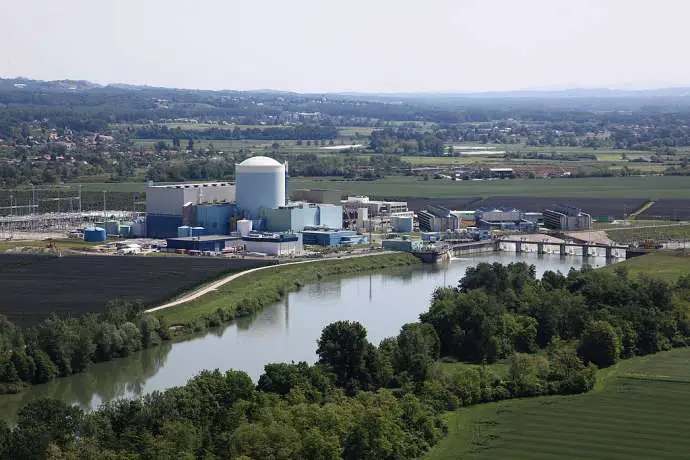STA, 15 April 2022 - Parties that polls suggest have a chance of making it to parliament in the 24 April general election support building unit 2 of the Krško nuclear power plant (NEK 2), but most say it should be put to a referendum first. The Left says the project should be put on hold until broad public debate is held on issues involved.
Judging by their answers to the STA's questions, the parties oppose extending the lifespan of the Šoštanj coal-fired power plant (TEŠ) and only the Alenka Bratušek Party (SAB) allows for a potential extension if such a decision was taken in dialogue with the local community.
All parties also underscore the need for a just restructuring of the Šalek Valley, which is home to TEŠ and the mine supplying its coal.
While there is unity on the need to increase supply from renewable sources, the Left and some smaller non-parliamentary parties oppose building new hydro power stations on the Central Sava, citing negative impact on biodiversity and ecosystems.
On NEK 2, the Left says it should be suspended in order to conduct a broad debate on potential alternatives and issues such as storage of nuclear waste, while the final decision should be taken by citizens in a referendum.
The Freedom Movement, the party of Robert Golob, a former energy executive, urges setting out a long-term programme of nuclear energy production, examining all potential technologies and suppliers, and drawing up comprehensive investment paperwork, which should be subject to an independent audit.
"Only once we have a comprehensive picture, it's right that people take an informed decision on the matter in a referendum," the party says. In fact all centre-left opposition parties advocate holding such a referendum.
Like its coalition partners, the ruling Democratic Party (SDS) supports NEK 2, describing preparations and the launch of procedures for the project as the most important commitment delivered in the field of energy by this government (an energy permit for unit 2 has been issued under this government).
Connecting Slovenia, an alliance that also includes the ruling coalition party Concretely, sees NEK 2 as a transitional solution in a bid to increase Slovenia's self-supply and preserve lower prices. However, for a long-term sustainability Slovenia needs projects to tap on its potential in geo-thermal energy, wood biomass, wind, sun and micro hydro power plants.
Another government party, New Slovenia (NSi) supports NEK 2 and hydro-power plants as well as geothermal and solar energy, and sees hydrogen as a fuel of the future. The goal is for Slovenia to become a net electricity exporter.
The party promises financial schemes to cover investments in renewables though savings and earnings and tackling red tape so that small hydro power stations can be built on rivers and streams.
The centre-left opposition parties support NEK 2, provided "transparent financial and technological project plan, broad public and expert debate held beforehand and a consultative referendum" as the Marjan Šarec List (LMŠ) put it, warning that NEK 2 should not become another TEŠ 6 where "some government moves are not inspiring trust that this would not happen".
Given the project is supported in a referendum, the SAB would support building a modular-reactor power station. Apart from increasing production from renewable sources, they also see investment in power distribution networks and energy storage facilities as urgently needed.
In a bid to reduce dependency on exports, such investments are also supported by several other parties. The Social Democrats (SD) call for investment in all types of renewables, including in producing and extracting green gases, green hydrogen and synthetic methane. The party will also support hydro power stations on the Central Sava if the project is adopted in a strategic document.
Meanwhile, the opposition National Party (SNS) says that while they absolutely support building NEK 2, it should not be built in cooperation with Croatia, which owns half of the Krško nuclear power plant. The party also opposes wind farms, which it says have proved to be bad investment in Slovenia.
Some parties propose dates when Slovenia should phase out coal and shut down TEŠ; the Left says coal should be fully abandoned by 2030 and the SDS says TEŠ should end its operation by 2032 as the Freedom Movement says extending TEŠ's lifespan beyond 2033 would not solve challenges of safe supply with fossil fuels.
All parties support boosting investment in renewables, where the SDS would favour those which do not create additional financial burdens on the population and businesses due to support schemes. One of the key solutions they see is building a liquefied natural gas terminal as soon as possible.
The Freedom Movement finds it worth continuing to exploit the energy of the Sava if siting of new stations can be done in a socially and environmentally acceptable way. Domestic production of biofuels, synthetic fuels and hydrogen would help Slovenia reduce its reliance on exports.
The Left bets on solar, wind and geothermal energy, reducing the volume of car traffic and increasing public passenger traffic and boosting energy efficiency of households and businesses.
The Pirate Party is in favour of NEK 2 if the contractor is picked based on appropriate references, but "strongly against" any further procedures to build hydro power stations on the Central Sava.






